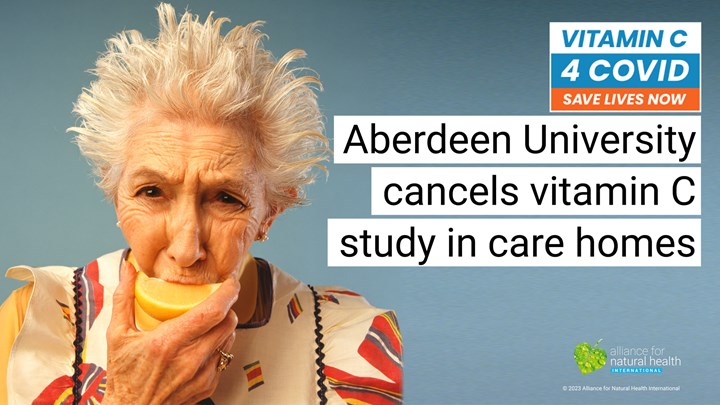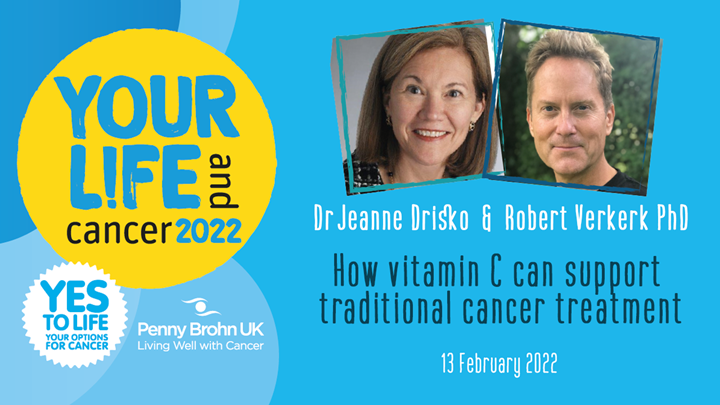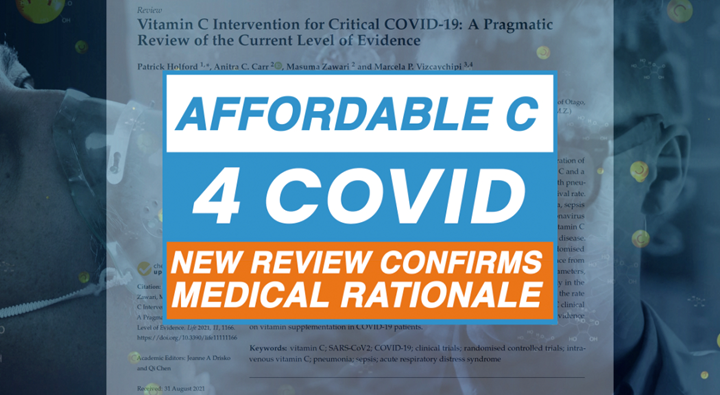Content Sections
By Rob Verkerk PhD, founder, executive and scientific director
If you’re a human, gorilla, chimp, fruit bat or guinea pig (among the few species that have lost the ability to make vitamin C within the body), you live in the northern hemisphere, and you’re not taking vitamin C more than once a day, you’re likely to be putting yourself at unnecessary risk from respiratory infections.
If you’re older, or you suffer from underlying conditions such as heart disease, cancer, diabetes or obesity, these could be life threatening. Covid-19 is but one virus, of over 200, known to infect the human airway and cause respiratory diseases.
Not only can we not make our own vitamin C, we also don’t get anything like enough from our diet. More than that, our vitamin C requirement increases 10 times or more when our immune system is challenged by infection.
But there’s more still. There’s mounting research on the importance of high dose vitamin C as an adjunct therapy for those seriously ill with covid disease – and, those who suffer the worse impacts from the disease, have very low vitamin C status. Their circulating levels of vitamin C are so low – they’re likely to be firmly within the levels that cause the vitamin C deficiency disease, scurvy. Yes, scurvy may be a historic disease, but it’s very much with us in this modern world in which the vitamin C content of our industrialised food supply is so low that, for most of us, our only option is now to take vitamin C as a supplement. Or if we get really sick, have it administered intravenously by forward-thinking medics.

This all sets the scene for why a global campaign – something we’re thrilled to be a part of – is so necessary and why it’s been launched this week, on the back of a review article published in the journal Nutrients that puts all the arguments and science in one, neat place.
That makes it harder for those who’re not keen to accept that a humble vitamin, like vitamin C, has so much to offer, at such low cost, and with such an extraordinary safety profile. Put as simply as we can: taking vitamin C as a preventative and then, upping your intake if you’re infected, is a no brainer. So is using vitamin C intravenously for those with acute respiratory infections, or sepsis, in critical care.
So much so, that we argue – given the now available evidence – that doctors and other health professionals who avoid recommendations on vitamin C in relation to covid disease prevention and treatment, should be considered medically negligent.
Note: You will see an advertising banner beneath our videos that play off the Brighteon platform (when they are not maximised). This advertising helps support the Brighteon platform that doesn't charge subscribers for their content, is committed to free speech, yet is also respectful of copyright-related law. We'd like to clarify that no advertising revenue from Brighteon is received by the Alliance for Natural Health Intl.
International Vitamin C campaign launches this week
On 7th December, a landmark paper on the importance of vitamin C was published. Lead author and instigator of the international campaign is none other than nutritionist and best-selling author Patrick Holford. Patrick has pulled together many of the leading scientists and clinicians working with vitamin C and other vitamins, including Dr Paul Marik, leading the Front Line Covid-19 Critical Care Alliance in the US, and Ass Prof Anitra Carr from the University of Otago in New Zealand, both of whom have been working with vitamin C in both sepsis and covid-19 patients.
I’m honoured to have been asked by Patrick to join the scientific advisory board and act as campaign advisor for the newly launched Vitamin C 4 Covid campaign.
How to C sense
Our asks are fourfold:
- Make sure you’re taking optimum amounts and forms of vitamin C for prevention. Check out the website and our video above for more information.
- Sign the petition on the campaign website if you’re a concerned member of the public or a health professional.
- Share this as widely as you can so we have enough support from the petition to put pressure on health authorities to include vitamin C in public health messaging, as well as increasing awareness of the benefit and almost zero risk of vitamin C among critical care doctors as an adjunct therapy
-
Please donate to the campaign – so we can help finance professional PR activities to maximise impact.
Find out more
>>> ANH-Intl vitamin D campaign
>>> ANH-Intl Covid - Adapt, Don't Fight campaign








Comments
your voice counts
11 December 2020 at 10:31 am
Thank you for this article on Vit C. I have previously posted that I find it criminal that Vit C and A/D are not promoted here in the Netherlands for supporting the immune system and giving parents the chance to do something for their families instead of just waiting for the off chance of getting the Covid virus.. Many people are overly anxious because they do not know that they can do anything to prevent viral infections. I also wonder why they do not give Vit C injections to the patients in intensive care. So much clinical evidence of this life saving Vit C when injected against heavily infected lungs.
Sincerely, Sheila de Koekkoek-Whitaker. The Netherlands.
11 December 2020 at 11:05 pm
I also agree with Sheila above. I found it really strange that when COVID was announced as a pandemic, the government prohibit vitamins. You could not buy any seeds either. I guess they don't want us HEALTHY. COVID is #CrimesAgainstHumanity and support the World Doctors Alliance (who shared this article with me) and many other organizations exposing the agendas. I take my vitamins A, C and D regularly with zinc and nano silver. I don't suffer from any real illness and barely visited the hospital in my over 40_ years of human existence. I will probably avoid all hospitals at all cost since they are getting paid to assign everything as a COVID case and we have to fight the lies.
12 December 2020 at 11:44 am
A very important point - the ADRENAL GLANDS are the biggest users of Vitamin C. but as Vit C is water-soluble it must be taken throughout the day as Rob Verkerk indicates.
One could write a large book on just the Adrenal Glands, and their crucial role in the body. these tiny glands are the "fight or flight" glands and work so very hard 24/7.
Another role of Vit C is if one has constipation then ingesting Vit C is not only going to help so many areas of the body, but going to REALLY help people with bowel/constipation problems. You increase the dosage until looseness /Diarrhoea occurs, then slightly lower the dosage and that indicates the individuals need/level of Vit C dosage required.
Sometimes a little more or less when there are emotional pressures- its a learning curve for the individual.
Put Buffered Vit C powder into your daily water bottle and drink throughout the day.
A Nurse who had twisted bowel at 4 years old, and then as a 48 year old had for years had a bowel movement once every 3 or even 6 weeks. Suggested the above Buffered Vit C and within a week she was moving along and in an SMS recently she has no problems at all. Drs wanted to operate on her bowel. She also feels so much better in other areas of her body.
Another lady recenlty I suggested the above treatment - 45 year old with Endometriosis, in a few days she said she had much more energy in her business dealings and bowels functioning so much better. Endometriosis on the increase in this Polluted world. Shall be interesting to see how her Endometriosis is in 3-6 months time, and if she still takes the Obstet/Gynae -prescribed pain killers.
So many positive stories re cost effective harmless Vit C, the body washes it out if too much and loose bowels/pr constipation tell one what to do to correct dosages.
12 December 2020 at 1:59 pm
Thoughts on liposomal Vit C?
Your voice counts
We welcome your comments and are very interested in your point of view, but we ask that you keep them relevant to the article, that they be civil and without commercial links. All comments are moderated prior to being published. We reserve the right to edit or not publish comments that we consider abusive or offensive.
There is extra content here from a third party provider. You will be unable to see this content unless you agree to allow Content Cookies. Cookie Preferences